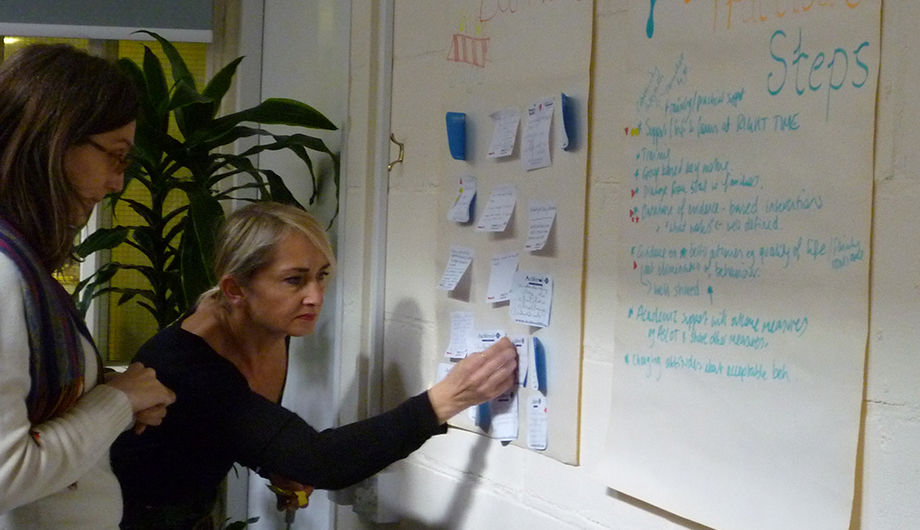To access information about our workshops in a downloadable format, read our Training Workshops Brochure.
Who should attend CBF workshops?
CBF workshops are specifically designed for families or professionals/support staff directly supporting children, young people or adults who have severe learning disabilities. The workshops are also suitable for those caring for children, young people or adults with moderate learning disabilities and autism but would not be relevant for those caring for people with Asperger syndrome/Autism with no leaning disability and who have good communication skills.
CBF workshops aim to promote a holistic partnership approach to behaviour support, so for the maximum impact we recommend that everyone likely to be involved in providing support attend the workshops – i.e. family carers, siblings over 16 years old, teachers, teaching assistants and learning support staff, health workers, short break staff, emergency service personnel etc.
All our workshops have been co-designed, co-developed and are co-delivered by family carers with lived experience, and qualified practitioners.
Are there online workshops?
As a response to the COVID-19 pandemic, we have recently made our workshops available online for groups of up to 12.
How many people can attend a workshop?
Ideally, 15 – 25 people should attend each face-to-face workshop, up to a maximum of 30. For organisations offering workshops to both staff and families, the maximum group size of 30 should comprise of 15 family carers and 15 professionals.
On-line workshops are for groups of up to 12 people.
How long does each workshop last?
Understanding Challenging Behaviour (UCB) and Supporting Behaviour Change (SBC) are both 4.5 hours, including breaks. For workshops with family carers we recommend 10.00 to 14.30 with a break for lunch.
The PBS one-day intensive workshop for professionals (UCB and SCB combined) lasts for 7 hours, including breaks, from 09.30 to 16.30.
PBS Awareness, Pica Awareness and Communication workshops last for 4.5 hours, including breaks (timings can be flexible).
Read the complete list of courses, with topics
Why is there a gap between the two PBS workshops?
We recommend allowing approximately one month between Understanding Challenging Behaviour and Supporting Behaviour Change to allow participants opportunity to practice recording episodes of challenging behaviour and identifying possible reasons for the behaviour, prior to developing positive behaviour support strategies when they come back together.
Can other family members attend the workshops?
Yes, we welcome mums and dads, grandparents, siblings over 16 – anyone who is involved in the day-to-day life of the person with behaviour described as challenging.
Some of the families who would like to attend workshops will need a translator. Can the CBF provide this?
The host organisation will need to provide translators where needed, and should inform the CBF so that we can allow additional time in the workshops.
Can families bring their family member with severe learning disabilities to the workshop?
The workshops are not suitable for children or adults with severe learning disabilities, or any other children below the age of 16. Siblings over the age of 16 are welcome to attend. The trainers will be flexible to accommodate any additional needs of workshop participants.
If we want to book a workshop, what do we need to provide?
You will need to be able to invite all of the participants and liaise with them before and after the workshop. You will also need to provide a suitable room with tables and chairs for up to 30 participants with suitable access. We also ask you to provide refreshments, and ideally also lunch, or you could ask your participants to bring their own lunch with them. A screen and projector, flip chart and pens will also be needed.
How do I get workshops in my local area?
You could ask your school, carers group, local authority or other organisation to host the workshops.
If the person you support receives direct payments, you might be able to find other people with direct payments and together you could discuss the need to host workshops with the local authority or NHS commissioner.
Why might PBS be a helpful approach?
PBS is about:
- Support led by values of choice, respect and inclusion for all people
- Understanding why people challenge and basing support around that understanding
- Improving quality of life (as a strategy and as a measure of success)
- Awareness and exploration of the many possible reasons for challenging behaviour
- Long-term commitment to supporting positive behaviour change
How do we make PBS happen?
PBS should be practiced by everyone who supports the person, in a consistent way. We can tell you more about putting it in place for a whole organisation. Families can attend our workshops together or share information so the whole family is on board and support their relative consistently.
For more information about why PBS might be a helpful approach, and how to implement it, see the PBS FAQs on our website.
How do I get in touch?

Further information about workshops
Please contact us using the form at the bottom of the page here for further details about our workshops, or email us using workshops@thecbf.org.uk or call us on 01634 838739.
Hosting CBF workshops
Organisations wishing to host a workshop should download, complete and email back the Expression of interest to: workshops@thecbf.org.uk

